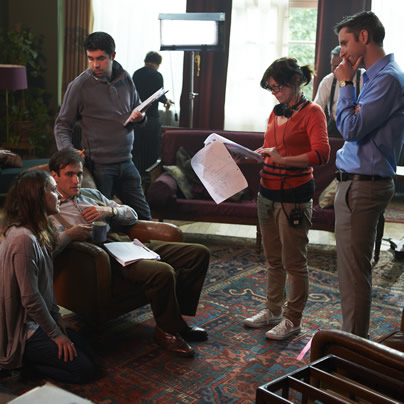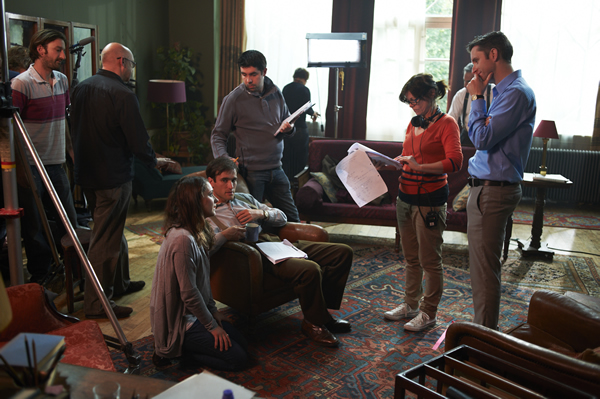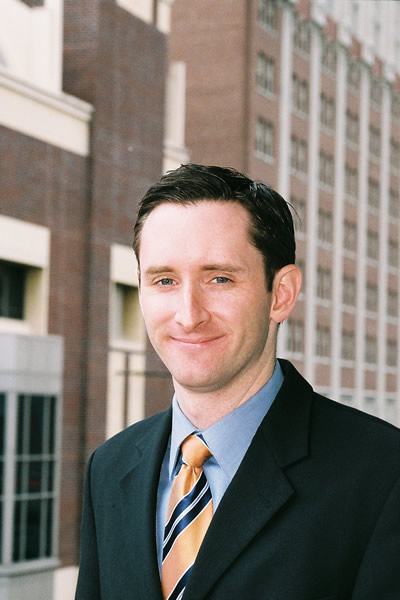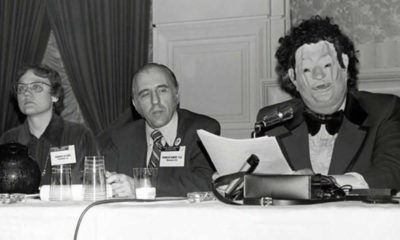Arts & Entertainment
Tragic hero
Film tells story of Alan Turing — from cracking Nazi code, to chemical castration and suicide


Patrick Sammon, right, on the set of his new docu-drama ‘Codebreaker’ in London. (Photo by Marc Sethi)
Scientist cracks codes to help defeat Germany during World War II, essentially laying the groundwork for modern computer science, but is busted for being gay and in 1950s England is chemically castrated and eventually commits suicide.
It’s a tragedy of epic proportions but such is the little-heard biography of Alan Turing. A new 81-minute docudrama about his life called “Codebreaker” debuts next week in Washington.
Novice filmmaker Patrick Sammon — a former executive director of the Log Cabin Republicans — says Turing’s story needs to be told.
“As I sorted through my hundred ideas,” Sammon says, “Turing’s idea quickly came to the top of the pile, because it was an amazing story, and I thought everyone should know about Turing’s contribution to our world. And then I realized there really hadn’t been a film like this done about him.”
The film (turingfilm.com) was released in the U.K. last year. Its U.S. premiere is Wednesday at the Georgetown AMC. It’s sponsored by the D.C. Center and tickets are available to the public (todpix.com/codebreaker). An advance screening and discussion were held last week at the National Press Club on the centenary of Turing’s birth and the film will also screen in New York on Oct. 25. Beyond that, TODpix, a distribution company, is working with grassroots organizations across the country to find audiences for additional showings.
Sammon, who’s gay, hopes to reach pockets of both the LGBT and tech communities to build a demand for additional screenings, culminating in “A Night with Alan Turing,” featuring screenings in 50 cities on Nov. 8.
Turing grew up in England in the early 20th century. He quickly stood out as a bright student and his teachers praised his “considerable powers of reasoning.” He developed a strong bond with fellow student Christopher Morcom. According to David Leavitt, novelist and Turing historian, “Morcom was, I think, more important to Turing than any other human being in his life. Turing was probably, in an adolescent way, quite in love with him.”
When Morcom died at a young age, Turing delved into his work as a sort of tribute to his late friend. As years passed, Turing developed the idea of the computer, broke encrypted German army messages during World War II and laid the groundwork for the future of artificial intelligence and mathematical biology.
Later in life, Turing had an affair with a 19-year-old named Arnold Murray, a friend of whose burgled Turing’s house early in 1952. Turing reported the crime, and the circumstances surrounding it, to the police. At the time, homosexuality was illegal in England and they charged Turing with indecency. Turing opted for hormonal treatment over prison, resulting in serious physical and mental side effects. Shortly after ending treatment, Turing committed suicide at the age of 41.
Sammon moved to Washington in 2003 to become a documentary filmmaker, but his career took a detour when he began working for, and ultimately running, the Log Cabin Republicans, a conservative organization that advocates for equal rights for the LGBT community. During this time, Sammon amassed many ideas for films. When he launched Story Center Productions in 2009, he partnered with a U.K.-based production company to help with his first film, “Codebreaker.”
He spent about six months in London during the production, which he’s been focused on full time since 2010. He factored in some living expenses into the production cost, which was funded largely from Channel 4 in the U.K. and also on his savings. Other donors, foundations and corporations including Intel and Google helped finance the project.
Sammon calls the film a “drama-documentary,” saying, “A third of it is drama, recreation, and then two-thirds is documentary. It’s a good mix of those two elements, and I think they play well together.”
It features a myriad of interviews with Turing’s relatives and associates, historians and industry professionals. His work is widely recognized as the foundation of all modern-day technology. In the film, Google’s Alma Whitten describes his contributions as timeless, saying, “They’re the things that are fundamentally true, so they’re always going to be with us, in the same way that the things that Galileo and Newton contributed to physics are always going to be with us.”
Apple co-founder Steve Wozniak credits Turing with making possible all subsequent technology. “Alan Turing was sort of at the top of everything that ever developed,” Wozniak says in the film. “All the future research that was done by people, building real equipment that can compute.”
The interviews are juxtaposed with dramatizations of therapy sessions from Turing’s last year, while Turing was undergoing chemical castration. Ed Stoppard (“Upstairs, Downstairs”) plays Turing opposite Henry Goodman (“Taking Woodstock”) as Franz Greenbaum, Turing’s psychiatrist and friend.
Production for the dramatizations lasted only five days, but Stoppard’s performance is a stand-out piece of the film. He dramatizes the internal struggle that drove Turing to take his own life. Stoppard’s sometime-sardonic, sometimes-reflective comments mask a pain his character carried with him.
Sammon’s passion for the story stemmed from the injustice Turing faced despite his contributions to society.
“Here you have someone who is one of the key people who helped the Allies win World War II by breaking Germany’s naval enigma code,” Sammon says. “Then you have the technology world really giving Turing credit for creating the intellectual foundation for modern computer science. The paper he wrote in 1936 really laid down the key ideas for the modern computer.”
Sammon goes on to describe the “Shakespearean tragedy” that followed. “In spite of his genius, in spite of his amazing contribution to the war, the fact that he was gay, the government persecuted him because of it.”
During the course of a year of chemical castration, Turing took daily doses of estrogen. Effects of the treatment included shrunken testicles, a loss of his libido, a loss of body hair and the development of breasts. Months after the treatment ended, Turing’s body had not returned to its normal state. Sammon believes Turing elected the hormone therapy, in place of a year in prison, to avoid being taken away from his work.
Sammon, who says he has “a lot of other ideas” for future film projects though he’s focused on the “Codebreaker” distribution for now, says it’s important to recognize the historical accomplishments of the LGBT community and foster a more inclusive society. At the same time, he believes all people, regardless of sexual orientation, should admire Turing as a hero and a genius.
“I admire him very much because he was unconventional,” Sammon says. “I respect Turing for the fact of how unconventional he was, and he wasn’t afraid to be different. The sad part is society, at the time, didn’t have tolerance for differences.”
Leavitt describes Turing as a tragic hero we must learn from.
“His refusal to compromise or lie, under such circumstances, was nothing less than heroic — yet we must remember that, as a consequence of his heroism, he was erased from history for many years. Nor is the institutionalized hatred of gay men and lesbians any less of a reality today than it was in 1953. Even as we honor Alan Turing, we must be vigilant. We must not let ourselves lapse into complacency. This could happen again.”

Team DC, the umbrella organization for LGBTQ-friendly sports teams and leagues in the D.C. area, held its annual Night of Champions Awards Gala on Saturday, April 20 at the Hilton National Mall. The organization gave out scholarships to area LGBTQ student athletes as well as awards to the Different Drummers, Kelly Laczko of Duplex Diner, Stacy Smith of the Edmund Burke School, Bryan Frank of Triout, JC Adams of DCG Basketball and the DC Gay Flag Football League.
(Washington Blade photos by Michael Key)




















The 2024 National Cannabis Festival was held at the Fields at RFK Stadium on April 19-20.
(Washington Blade photos by Michael Key)
















Covering the @NatlCannaFest at RFK Stadium for @WashBlade . Stop by the LGBTQ+ booth and pick up a paper if you are here. pic.twitter.com/is7hnsaPns
— Michael Patrick Key (@MichaelKeyWB) April 20, 2024
Theater
‘Amm(i)gone’ explores family, queerness, and faith
A ‘fully autobiographical’ work from out artist Adil Mansoor

‘Amm(i)gone’
Thorough May 12
Woolly Mammoth Theatre
641 D St., N.W.
$60-$70
Woollymammoth.net
“Fully and utterly autobiographical.” That’s how Adil Mansoor describes “Amm(i)gone,” his one-man work currently playing at Woolly Mammoth Theatre.
Both created and performed by out artist Mansoor, it’s his story about inviting his Pakistani mother to translate Sophocles’s Greek tragedy “Antigone” into Urdu. Throughout the journey, there’s an exploration of family, queerness, and faith,as well as references to teachings from the Quran, and audio conversations with his Muslim mother.
Mansoor, 38, grew up in the suburbs of Chicago and is now based in Pittsburgh where he’s a busy theater maker. He’s also the founding member of Pittsburgh’s Hatch Arts Collective and the former artistic director of Dreams of Hope, an LGBTQ youth arts organization.
WASHINGTON BLADE: What spurred you to create “Amm(i)gone”?
ADIL MANSOOR: I was reading a translation of “Antigone” a few years back and found myself emotionally overwhelmed. A Theban princess buries her brother knowing it will cost her, her own life. It’s about a person for whom all aspirations are in the afterlife. And what does that do to the living when all of your hopes and dreams have to be reserved for the afterlife?
I found grant funding to pay my mom to do the translation. I wanted to engage in learning. I wanted to share theater but especially this ancient tragedy. My mother appreciated the characters were struggling between loving one another and their beliefs.
BLADE: Are you more director than actor?
MANSOOR: I’m primarily a director with an MFA in directing from Carnegie Mellon. I wrote, directed, and performed in this show, and had been working on it for four years. I’ve done different versions including Zoom. Woolly’s is a new production with the same team who’ve been involved since the beginning.
I love solo performance. I’ve produced and now teach solo performance and believe in its power. And I definitely lean toward “performance” and I haven’t “acted” since I was in college. I feel good on stage. I was a tour guide and do a lot of public speaking. I enjoy the attention.
BLADE: Describe your mom.
MANSOOR: My mom is a wonderfully devout Muslim, single mother, social worker who discovered my queerness on Google. And she prays for me.
She and I are similar, the way we look at things, the way we laugh. But different too. And those are among the questions I ask in this show. Our relationship is both beautiful and complicated.
BLADE: So, you weren’t exactly hiding your sexuality?
MANSOOR: In my mid-20s, I took time to talk with friends about our being queer with relation to our careers. My sexuality is essential to the work. As the artistic director at Dreams of Hope, part of the work was to model what it means to be public. If I’m in a room with queer and trans teenagers, part of what I’m doing is modeling queer adulthood. The way they see me in the world is part of what I’m putting out there. And I want that to be expansive and full.
So much of my work involves fundraising and being a face in schools. Being out is about making safe space for queer young folks.
BLADE: Have you encountered much Islamophobia?
MANSOOR: When 9/11 happened, I was a sophomore in high school, so yes. I faced a lot then and now. I’ve been egged on the street in the last four months. I see it in the classroom. It shows up in all sorts of ways.
BLADE: What prompted you to lead your creative life in Pittsburgh?
MANSOOR: I’ve been here for 14 years. I breathe with ease in Pittsburgh. The hills and the valleys and the rust of the city do something to me. It’s beautiful, it’ affordable, and there is support for local artists. There’s a lot of opportunity.
Still, the plan was to move to New York in September of 2020 but that was cancelled. Then the pandemic showed me that I could live in Pittsburgh and still have a nationally viable career.
BLADE: What are you trying to achieve with “Amm(i)gone”?
MANSOOR: What I’m sharing in the show is so very specific but I hear people from other backgrounds say I totally see my mom in that. My partner is Catholic and we share so much in relation to this.
I hope the work is embracing the fullness of queerness and how means so many things. And I hope the show makes audiences want to call their parents or squeeze their partners.





















